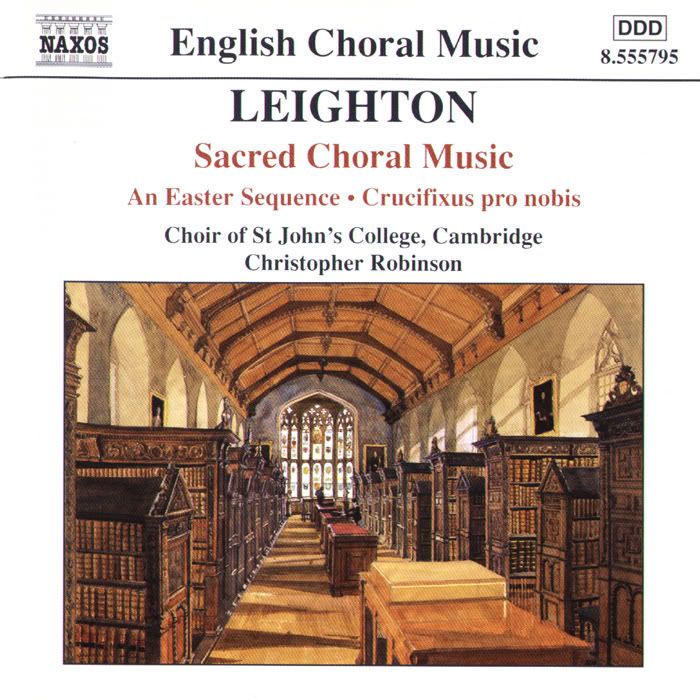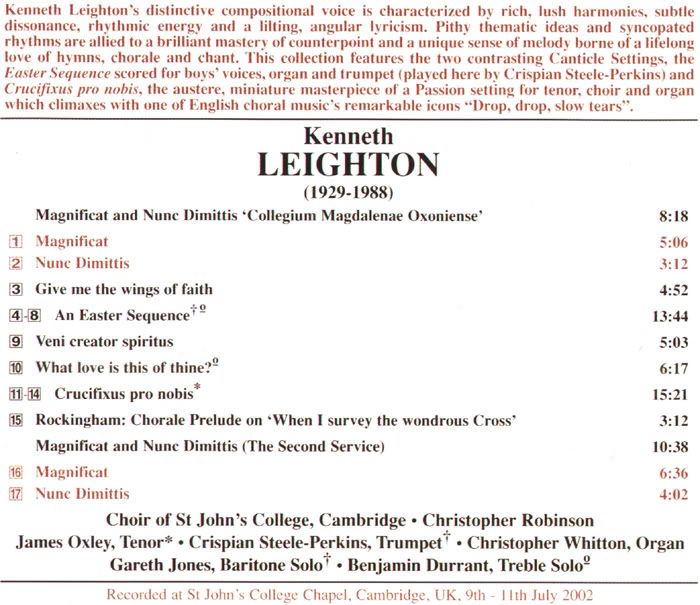 |
| NetLab · Rules · Torrent Tracker · Have a problem? · Eng/Rus |
 Help Help
 Search Search
 Members Members
 Gallery Gallery
 Calendar Calendar
|
| Welcome Guest ( Log In | Register | Validation ) | Resend Validation Email |
|
Posted: 18-12-2008, 01:13
(post 1, #870673)
|
||||||||||||||||||
|
Pro Member Group: Members Posts: 695 Warn:0% |
Kenneth Leighton (1929 - 1988) Sacred Choral Music Label: Naxos, 8.555795 Year: 2004 Performers: Benjamin Durrant - boy soprano Gareth Jones - baritone James Oxley - tenor Crispian Steele-Perkins - trumpet Christopher Whitton - organ The Choir of St. John's College, Cambridge Christopher Robinson - conductor Kenneth Leighton’s distinctive compositional voice is characterized by rich, lush harmonies, subtle dissonance, rhythmic energy and a lilting, angular lyricism. Pithy thematic ideas and syncopated rhythms are allied to a brilliant mastery of counterpoint and a unique sense of melody borne of a lifelong love of hymns, chorale and chant. This collection features the two contrasting Canticle Settings, the Easter Sequence scored for boys’ voices, organ and trumpet (played here by Crispian Steele-Perkins) and Crucifixus pro nobis, the austere, miniature masterpiece of a Passion setting for tenor, choir and organ which climaxes with one of English choral music’s remarkable icons "Drop, drop, slow tears". The sacred choral music of 20th-century British composer Kenneth Leighton (1929-88) has been fairly if not generously treated on disc, headed by excellent recordings from St. Paul's Cathedral (Hyperion) and the Finzi Singers (Chandos). This very fine collection joins those, duplicating some repertoire and adding to the list a performance of Leighton's first setting of the Magnificat and Nunc dimittis, subtitled Collegium Magdalenae Oxoniense in reference to the choir for which it was composed. The style of Leighton's compositions embraces the characteristics of much of the English cathedral music of the last century, including significant, often virtuosic organ parts and wide-ranging (both in vocal registers and dynamics) choral writing that incorporates substantial blocks of dissonance into the tonal harmonic structure, along with angular melodies and lively, often irregular rhythmic schemes that emphasize natural textual inflection (much of this a clear debt to Britten). The Choir of St. John's College and its director Christopher Robinson are totally at home in this music, powerfully conveying the drama of the Magdalene Magnificat in the huge tutti passages and then perfectly rendering the evocative opening of the anthem Give me the wings of faith with just the right prayerful sensitivity. Rhythmic precision is on abundant display throughout An Easter Sequence, which also features Crispian Steele-Perkins' bright trumpet and lovely treble solo singing by Benjamin Durrant, who returns in the motet What love is this of thine? An Easter Sequence also is memorable for the colorful organ solo passages and for its beautiful setting of the 23rd Psalm. The sound gives a realistic spatial/acoustic impression of the St. John's College Chapel while preserving good balances with organ and choir. The full-chorus and organ sections are really solid and powerful and the upper registers of the treble are bright and clear. The Naxos/St. John’s series of recordings of English church music continues with a tribute to Kenneth Leighton. This must be the ninth or tenth volume in the series. I’ve collected the whole set and can report that this latest installment maintains the high standards of its predecessors. Born in Wakefield, Kenneth Leighton was a chorister at that city’s Anglican cathedral, an experience that coloured much of his future musical life and which found expression especially in his music for the English church, a representative selection of which is included here. Leighton subsequently studied at Oxford, where his teachers included Bernard Rose and much of his later career was devoted to academic appointments at the universities of Leeds, Edinburgh and Oxford. There is nothing academic about his music, however. That speaks to the listener directly, colourfully and eloquently. A pair of "Mag and Nuncs" bookend this recital. The earlier setting is dedicated to Leighton’s former teacher, Bernard Rose. The Magnificat is distinguished by some vigorous choral writing and a demanding organ part. It culminates in an ebullient ‘Gloria’. By contrast, there’s a gentle ecstasy at the opening of the Nunc Dimittis but the setting expands to an affirmative conclusion with a splendidly sonorous organ part. By and large, the canticles of the Second Service are less forthright in character. The Magnificat gradually gathers momentum and intensity before subsiding into a tranquil ‘Gloria’. The hues of the Nunc Dimittis are somewhat dark. Both sets of canticles are probably among the standard fare at St John’s and are sung with conviction and assurance. As has been the case with several previous volumes in this series, the choral items are broken up by the inclusion of a couple of organ solos. The choices here are particularly felicitous. Veni Creator Spiritus opens quietly, the plainchant theme subtly underpinning the texture. Gradually the piece builds to an impressive, majestic central climax before subsiding again to the reflective mood in which the piece stirred to life. In this fairly brief piece Leighton exploits the range and sonority of the instrument effectively. Rockingham is a subdued meditation. It’s a little oasis of calm refreshment. Both pieces are well played by Christopher Whitton, one of the college’s Organ Scholars at the time of this recording. The two larger works complement each other well in terms of the subjects they address. An Easter Sequence was commissioned by an American boy’s choir for a service in Paris. The chosen texts comprise four Proper texts from the liturgies of the first and second Sundays after Easter, Psalm 23, and an antiphon from the First Vespers of Ascension Day. The scoring for boy’s voices conveys wonderfully the pure, chaste joy of Easter and the clean textures of the music are enhanced and given extra point by the inclusion of a silvery trumpet. The choir sing excellently, displaying excellent diction and rhythmic alertness. The music is delightful and it is expertly crafted (as is everything on the disc.) Though I’m sure it’s not easy music to perform the boys make it sound great fun to sing. This work was new to me and I’m very glad it was included. Crucifixus pro nobis is a tougher proposition, as befits its subject. The four movements set texts by two seventeenth-century English metaphysical poets, Patrick Carey (d. 1651), and Phineas Fletcher (1582-1650). The poems, which deal with aspects of Christ’s passion, are rich in imagery, to which Leighton responds imaginatively. The work concludes with a fine setting of Fletcher’s celebrated text, ‘Drop, drop, slow tears’. The music is the most challenging on the disc, being cast in darker hues and distinguished by comparatively astringent harmonies. James Oxley is an eloquent soloist in the first piece, ‘Christ in the Cradle’ and later sings with suitable drama in ‘Christ in his Passion’ The chorus sing their music powerfully. In the concluding ‘Drop, drop, slow tears’ they realise well the gentle luminosity of Leighton’s music, which conveys admirably the bitter sweetness of the Crucifixion. This is another fine achievement by Christopher Robinson and his St. John’s forces. In general the choral blend is good, though there were times when I thought the tenor line was a little too prominent. The singing is committed, responsive and incisive and diction is very good. Some of Leighton’s organ accompaniments are powerful but I thought that the engineers generally integrated the choir with the organ very successfully. On my equipment and through headphones the sound is satisfying and full. The notes by Andrew Burn are very good and full English texts are provided. Christopher Robinson retired from St. John’s twelve months after setting down this disc following a very distinguished period of twelve years as Organist and Director of Music at the college Is this the last of his recordings that Naxos has "in the can"? I’d like to think there might be more (a Parry disc, perhaps?) If not, this is an excellent final installment in a fine and enjoyable series. I strongly recommend this CD to all those who love the music of the English church. Tracklist: 01. Magnificat and Nunc Dimittis 'Collegium Magdalene Oxoniense': Magnificat 5:04 02. Magnificat and Nunc Dimittis 'Collegium Magdalene Oxoniense': Nunc Dimittis 3:18 03. Give me the wings of faith 4:51 04. An Easter Sequence: Introit (for the First Sundy after Easter) 0:51 05. An Easter Sequence: Gradual (for the First Sunday after Easter) 1:22 06. An Easter Sequence: Offertory (for the First Sunday after Easter) 2:25 07. An Easter Sequence: Communion (for the First Sunday after Easter) 4:52 08. An Easter Sequence: Sortie (Antiphon at First Vespers of Ascension Day) 4:11 09. Veni creator spiritus 5:05 10. What love is this of thine? 6:17 11. Crucifixus pro nobis, Op. 38: Christ in the Cradle 3:22 12. Crucifixus pro nobis, Op. 38: Christ in the Garden 3:34 13. Crucifixus pro nobis, Op. 38: Christ in his Passion 6:05 14. Crucifixus pro nobis, Op. 38: Hymn 2:17 15. Rockingham: Chorale Prelude on 'When I survey the wondrous Cross' 3:12 16. Magnificat and Nunc Dimittis (The Second Service), Op. 62: Magnificat 6:33 17. Magnificat and Nunc Dimittis (The Second Service), Op. 62: Nunc Dimittis 3:57   LOG
This post has been edited by kgkk on 18-12-2008, 01:21 |
||||||||||||||||||
|
|||||||||||||||||||


Powered by Invision Power Board v1.3.1 Final.

